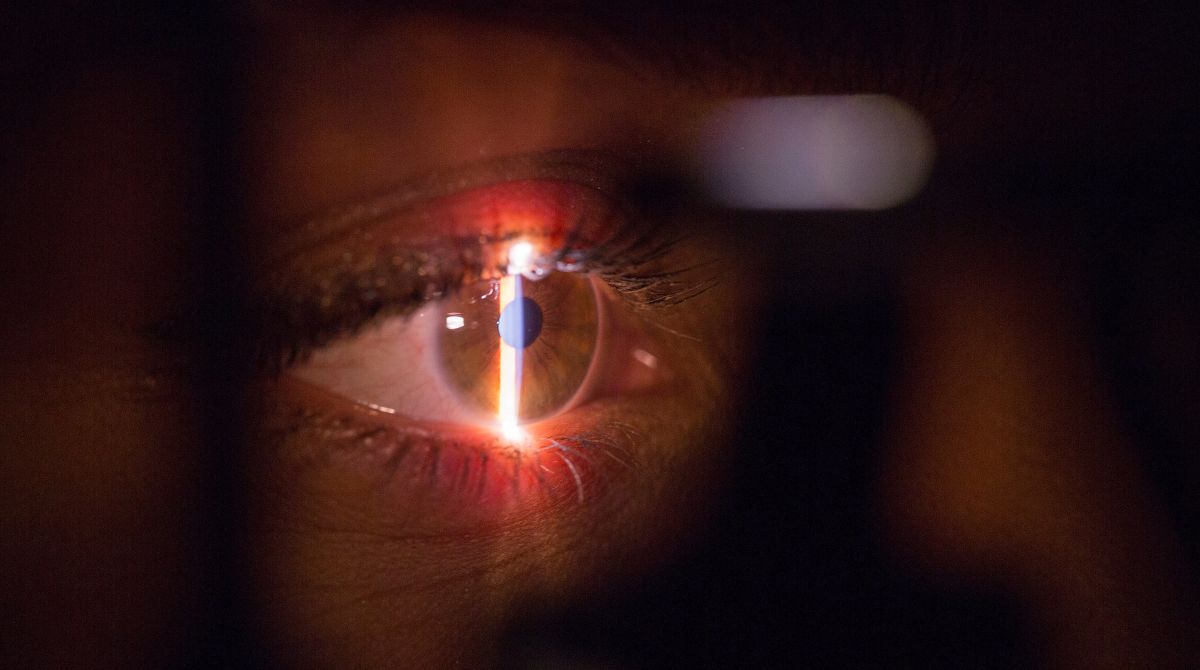Risk of heart disease can be predicted with simple eye test through artificial intelligence algorithm, research involving Kingston University finds
Posted Wednesday 23 November 2022
 Kingston University researchers developed an AI algorithm that can assess a single retinal image in less than a minute to help predict risk of heart disease. Image credit: Brands&People, Unsplash.
Kingston University researchers developed an AI algorithm that can assess a single retinal image in less than a minute to help predict risk of heart disease. Image credit: Brands&People, Unsplash.
Artificial intelligence-enabled eye scans could be used to rapidly and accurately predict whether a person is at high risk of heart disease, a new study involving researchers from Kingston University has established.
The findings could pave the way for cardiovascular screening to be done more quickly and simply by using cameras, without the need for blood tests or blood pressure measurements.
Circulatory diseases, including cardiovascular disease, coronary heart disease, heart failure and stroke, are major causes of ill health and death worldwide, currently accounting for one in four UK deaths alone. While several risk frameworks exist, these aren't always able to accurately identify those who will go on to develop or die of circulatory diseases.
As part of the study, Kingston University Professor of Computer Vision Sarah Barman and postdoctoral researcher Roshan Welikala developed artificial intelligence (AI) algorithms that could reliably measure features on the retinal image, such as the width of blood vessels and how curved they were.
Working with colleagues from St George's, University of London, the NIHR Biomedical Research Centre at Moorfields Eye Hospital and UCL Institute of Ophthalmology, as well as the MRC Epidemiology Unit at Cambridge University, they demonstrated this AI-enabled imaging could specify the risk of cardiovascular disease and stroke and act as an alternative predictive biomarker to traditional risk-scores for vascular health. The findings have now been published in the British Journal of Opthalmology.
"Through this research we've shown an artificial intelligence eye scan that could be routinely carried out on the high street by an ophthalmologist is as good as a standard measure of cardiovascular risk," Professor Barman said. "Everyone who goes to the optician gets an eye scan and, as opposed to the standard methods that require a blood test from the GP, this type of screening would just need a retinal image and a few details, such as age, whether the patient smokes or not and some questions relating to their medical history.
"This method, which would allow wider screening of the population in a non-invasive way that could lead to early preventative treatments for those found to be at greater risk, has considerable potential."
The researchers developed a fully automated AI-enabled algorithm, called QUARTZ, to assess the potential of retinal vasculature imaging alongside known risk factors to predict vascular health and death. The algorithm can assess a single retinal image in less than a minute.
Retinal images from 88,052 UK Biobank participants aged 40-69 were scanned using the algorithm, looking specifically at the width, vessel area and degree of curvature of the vessels to develop prediction models for stroke, heart attack and death from circulatory disease. These models were then applied to the retinal images of 7,411 participants, aged 48-92, of the European Prospective Investigation into Cancer (EPIC)-Norfolk study.
The performance of QUARTZ was compared with the widely used Framingham Risk Scores framework. The health of participants was tracked for an average of seven to nine years, with a non-invasive risk score based on age, sex, smoking, medical history and retinal vasculature found to have performed as well as the Framingham framework.
- Find out more about undergraduate and postgraduate computing courses in the Faculty of Engineering, Computing and the Environment.
- Read the full paper in the British Journal of Opthalmology.
- FInd out more about research at Kingston University.
Contact us
General enquiries:
Journalists only:
- Communications team
Tel: +44 (0)20 8417 3034
Email us



